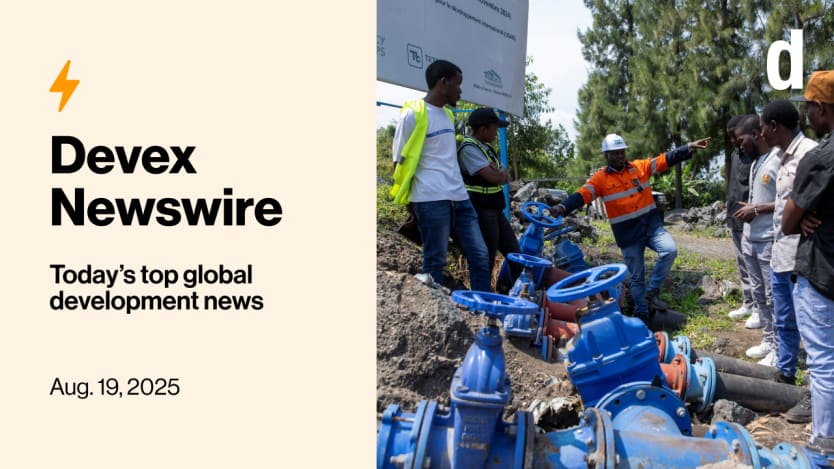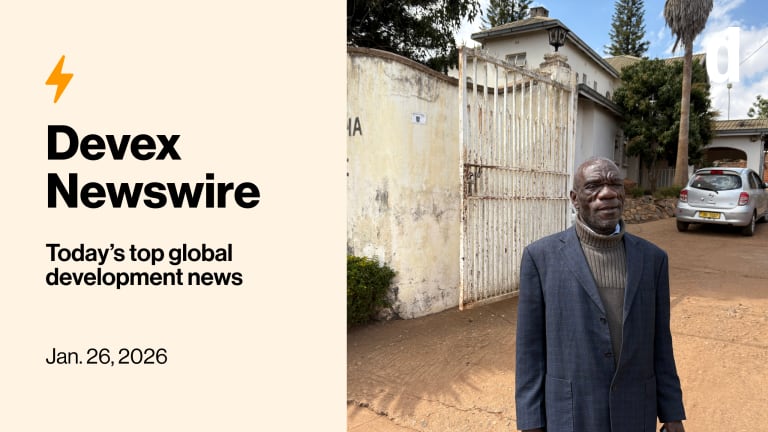Presented by Concordia

U.S. President Donald Trump has very publicly tried to end the wars in Ukraine and Gaza, with results that seem to fluctuate daily. Further below the global radar is the conflict between the Democratic Republic of Congo and rebels widely seen as backed by Rwanda. The Trump administration did broker a precarious peace deal for the DRC, but the president’s aid cuts have hammered the beleaguered country just as the violence picks back up again.
Also in today’s edition: Can you insure against climate disasters? And can defense dollars go to fighting those disasters?
Double devastation
“A double war.” That’s how Marie, a civil society leader from the city of Bukavu, describes the situation in eastern Democratic Republic of Congo. “Once with the violence from the rebels, and then again with the impacts of the USAID cuts,” she says through a translator.
For the last eight months, it’s been one blow after another for Marie and her organization, whose identities we are concealing for safety reasons. In February, rebel forces took over Bukavu. Soon after, Marie’s U.S.-funded program was canceled.
“There were no donors, no money, no activities,” she says. “The few local organizations that were able to survive, it was because they had different donors.”
The United States used to make up the backbone of humanitarian assistance in the DRC, contributing over $1 billion to the country in 2023, my colleague Elissa Miolene writes. In March, the Center for Global Development analyzed the Trump administration’s cuts to USAID at the country level and found that the DRC lost $387 million this year alone.
The result? Suffering on a staggering level.
Oxfam, for example, ran a water, sanitation, and hygiene program that was supporting hundreds of thousands of people. That program was canceled, and overnight, 700,000 people lost access to clean water and basic sanitation. Today, 500 people in two towns are sharing one water tap, according to the organization.
“This is a full-blown public health emergency,” said Manenji Mangundu, Oxfam’s director in the DRC, in a statement. “Families are returning to ruins — no shelters, no toilets, no clean water. … The air reeks of sewage. Hospitals are out of medicine, and we can’t reach cut-off communities with even the most basic aid.”
As for the peace deal, it was positioned by the administration as a way for the U.S. to tap the DRC’s critical mineral wealth while cutting off Chinese access to it. Regardless of the motivation behind it, the deal isn’t holding anyway.
“What do you need to have a peace process that works?” said Abby Maxman, president and CEO of Oxfam America, speaking to Elissa just after she returned from the DRC. “You can’t have communities who are hungry, sick, and with nothing — and scared.”
Read: The US brokered peace in eastern DRC. Aid cuts have undermined it
+ Next week is Devex’s annual Pro Week, in which we focus on the key issues that matter most to our professional members. This year, as funding comes under pressure, and calls grow for reform of development, we’ll spend one day looking at each of the key sections of the aid infrastructure, starting on Monday with a focus on philanthropy, followed by in-depth analyses of MDBs, bilateral donors, the United Nations, and the nonprofit sector.
We’ll have a bonanza of articles for our Pro members on everything from the Asian Infrastructure Investment Bank’s growing influence to the future of INGOs. We’ll talk U.N. architecture, emerging donors, and philanthropic advisers, host daily events, and produce in-depth reports, to prepare you for the year ahead and explain the chaotic months we’ve just witnessed. To access all of this exclusive content at a discounted rate, sign up for Devex Pro now.
Bold claims
Insurance has taken on a whole new dimension in the age of climate change. It’s also become the source of fierce debate between those who say insurance is key to convincing the private sector to invest in climate-resilient infrastructure — and those who say vulnerable countries shouldn’t have to pay higher insurance premiums for risks they didn’t cause.
One potential solution is parametric insurance, which is linked to certain climate-related thresholds such as rain volume or wind speed. Once the threshold is reached, the insurance company pays out, whether or not any damage was actually sustained.
The pros? Parametric insurance is cheaper and easier for insurers because it doesn’t require a full risk assessment. No risk assessment also means quicker access to funds for affected countries, my colleague Jesse Chase-Lubitz explains.
The con? A house could be destroyed with wind speeds up to 89 miles per hour, and if parametric insurance kicks in when it hits 90 miles per hour, the insured could be left in the lurch.
That’s why some say investment needs to come before insurance.
“The rising certainty of more frequent losses is not insurable,” Avinash Persaud, special adviser on climate change to the president of the Inter-American Development Bank, argues. “There is also the moral issue that victims would be paying for the actions of others.”
Instead, he advocates investing in resilience to make losses "uncertain, infrequent, and insurable again. Only then can insurance step back into the picture.”
Regardless, a broader conversation needs to take place, says Pepukaye Bardouille, director of the Bridgetown Initiative.
“There’s no magic wand here,” she says. “But we thought that putting our heads together to figure out how we can bring insurance to the table, rather than shouting at them to go find a table to sit at, would be much more productive.”
Read: Will climate insurance save us or fail us? (Pro)
Dollars and sense
NATO has pledged to increase defense spending to 5% of gross domestic product by 2035. Patrick V. Verkooijen, CEO of the Global Center on Adaptation, argues that investing some of that money into fighting climate change makes security sense.
“This is the new front line of global security. It is not just about missiles or tanks — it is about whether our societies can withstand a rapidly changing planet,” he writes in an opinion piece for Devex. “And nowhere is that investment more urgently needed, or more potentially transformative, than in Africa.”
“Africa is home to 17 of the 20 countries most vulnerable to climate change — yet it receives just 3% of global climate finance,” he points out. “At the same time, it is the continent with the youngest population, the fastest urbanization, and the greatest untapped potential for green growth and sustainable infrastructure. If the world fails to invest in climate adaptation in Africa, the result will be rising insecurity that stretches far beyond its borders.”
Opinion: Climate security is national security. Africa is our first line of defense
Alice in AGRA-land
Alice Ruhweza took the reins of AGRA on March 1, just as USAID imploded. Donors were pulling back, but AGRA still had rare breathing room: a $350 million Mastercard Foundation grant to create youth jobs and fresh support from the Green Climate Fund, amounting to $105 million to reduce post-harvest losses.
Still, she’s looking at various opportunities to pump money into food systems, my colleague Ayenat Mersie writes.
“When I came in, one of my first questions was: With public finance dwindling, why is it that this sector hasn’t attracted more investment? I’m delighted to see others in the sector also looking at this. Blended finance is important — how do we de-risk private capital by using public finance? How do we get more investment in the sector?”
Originally founded as the Alliance for a Green Revolution in Africa, AGRA rebranded in 2022 to drop “Green Revolution” from its name — an attempt to distance itself from the industrial farming practices that underpinned the original movement.
“The future of fertilizer is organic. We can do this and move from dependence on synthetic to organic fertilizer in Africa,” Ruhweza tells Ayenat.
“I think GMOs [genetically modified organisms] are a sovereign decision of a country,” she adds. “So, for me, we do not have a specific position on this other than we provide the information that's available, and then the governments make decisions.”
Read: Alice Ruhweza's vision for AGRA and African agriculture
+ For more content like this, sign up to Devex Dish, our free weekly newsletter on the global food system.
In other news
A record 383 aid workers were killed in global hotspots in 2024, nearly half of them in Gaza during the Israel-Hamas war. [AP]
The U.K. government will evacuate 30 to 50 critically ill Palestinian children from Gaza for medical treatment in the coming weeks. [BBC]
A ship loaded with 1,200 tons of food supplies for the Gaza Strip is approaching the Israeli port of Ashdod on Tuesday, in a renewed effort to alleviate the worsening crisis as famine threatens the Palestinian territory. [The Washington Post]
Sign up to Newswire for an inside look at the biggest stories in global development.








